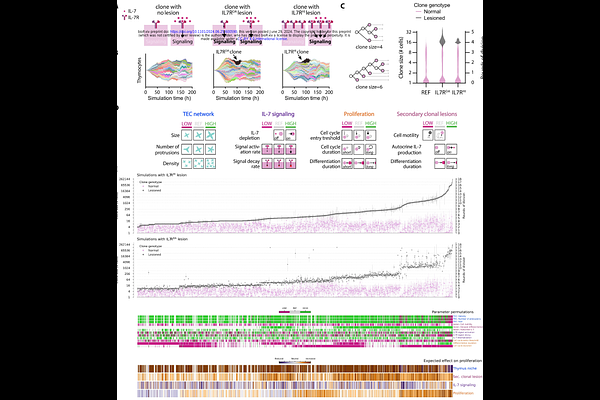Altered thymic niche synergistically drives the massive proliferation of malignant thymocytes

Altered thymic niche synergistically drives the massive proliferation of malignant thymocytes
Tsingos, E.; Dick, A. M.; Bajoghli, B.
AbstractThe discovery of genetic alterations in patient samples over the last 20 years has promoted a cell-autonomous view of proliferative expansion during T-cell acute lymphoblastic leukemia (T-ALL) development in the thymus. However, the potential contribution of non-cell-autonomous factors, particularly the impact of thymic epithelial cells (TECs) within the thymic niche during the initiation phase, remains unexplored. In this study, we employ a unique combination of a cell-based computational model of the thymus and in vivo experiments. We systematically analyze the impact of 12 cell-autonomous and non-autonomous factors, either alone or in combinations, on the proliferation of normal and malignant thymocytes with interleukin-7 receptor (IL7R) gain-of-function mutations or elevated IL7R levels, as observed in T-ALL patients. By simulating over 1500 scenarios, we show that while a dense TEC network favored the proliferation of normal thymocytes, it inhibited the proliferation of malignant lineages, which achieved their maximal proliferative capacity when TECs were sparsely distributed. Our in silico model predicts that certain mutations could accelerate proliferative expansion within a few days. This was experimentally validated, revealing rapid onset of thymus lymphoma and infiltration of malignant T-cells into other organs within 8 days of medaka (Oryzias latipes) embryonic development, thus revealing that modifications in the thymic niche and oncogenes in thymocytes together accelerate the disease development. Our results also suggest that negative feedback from the proliferative state inhibits differentiation of thymocytes, thereby prolonging the proliferative state and further fueling malignant expansion. Overall, this work reveals the critical impact of TEC-thymocyte interactions in both the initiation and progression of disease.